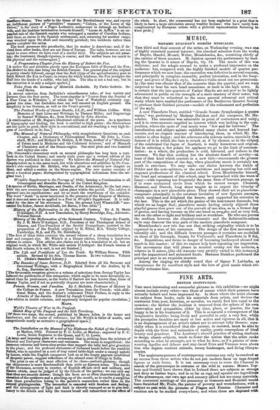MUSIC.
MADAME DULCREN'S sornios muinotaxs.
THE third. and final concert of the series, on Wednesday evening, waa one of highly sustained musical interest; the classical selection from. the works of Haydn, Handel, Mozart, Weber, Mendelssohn, &c., consisting chiefly of the rarities of those masters. M. Sainton opened the performance by lead- ing the Quartet in G minor of Haydn, Op. 73. The music of this was delicious; and the adagio seemed to make a profound impression on the audience: but, compared with the highly finished models of quartet per- formance which we now hear, the execution was defective in several respects, and principally in complete ensemble, perfect intonation, and in the buoy- ancy and grace of Haydn's style. Sainton's violin stood out too prominent- ly; the tone was oftener that of the concerto than the quartet; and we were surprised to hear his sure hand sometimes at fault in the high notes. It is certain that the late quartets of Father Haydn are not now to be lightly adventured in public on the strength of a mere mastery of their notes; but that they must be submitted to the same general rehearsal and critical study which have enabled the performers of the Beethoven Quartet Society to produce their finished pictures—models of the refinement and perfection, of the style.
A new Pianoforte Duet, entitled "Grande Sonate Symphonique Aqnatre mains," was performed by Madame Dulcken and the composer, Mr. Mo- schele.s. The execution was admirable in point of correctness and unity; and it in some measure supplied an interest which was lacking in the com- position, where the spots of real music were "few awl far between." The introduction and allegro agitato exhibited many choice and learned har- monies, and an elegant manner of introducing them, in which Mr. Me- scheles is often happy; and his seherzoso alla tedesca antka, especially that feature of it in which the bass is struck as if by chance, as in the subject of the celebrated Cat fugue of Scarlatti, is really humorous and original. But in selecting a few points for applause we go to the limit of commen- dation: as a whole, the production is cold, laboured, and tedious in th*, extreme. We fear that nothing but the absolute dearth of novelty—&, least of that kind which consists in a nevr title—recommends the greater part of the compositions of the day, when pianoforte music is certainly toe much in extremes. We may make our choice between the tinkle or Dohler and the note-splitters, or the ambitious and imposing but cold ea& stagnant productions of the classical school Even ldendelssohn himself, the head and ornament of this school, may be reproached with the want or fancy—with repeating too frequently the same form of Imvure. passage, an if in some enchanted circle from which he cannot escape. Clement', Hummel, and Dussek, long since taught us to -expert the vivacity or champagne ina new pianoforte piece. They showed their art as pianoforte- composers principally in the constant invention of new figurate passages, which surprised and delighted the hearer, and supported his attention to the last. This is the art which the genius of the instrument demands, but which we no longer find; pianoforte music having utterly abjured those playful graces that grew out of the pursuit of one idea, as in a former day of genius,and having become on the one hand so varyine and so very dull, and on the other so light and hrilliant and so worthless. He who can pursue the medium between the classical-romantic and the fashionable-salocm style may discover the true path of the modern pianoforte oompoter. MendeLssohn's new trio has not that striking originality which is to be expected in a man of his eminence. The design of the first movement is tolerably old; and the difficult bravura passages it contains are modelled, on those of his Serenade, Sonata for Violoncello and Pianoforte in B flak, &c. Repetitions, and, forms in danger of becoming hackneyed abound too' much in this master: of this we cannot help here repeating our impression. The movements that will please in musical society are the andante,ao scherzo in er minor, (the old staccato very prettily varied. in this instancea and the impassioned and animated finale. Madame Dukken performed the principal part in an exquisite manner.
Among the singing, we chiefly noted that of Signor F. Lablache, as conspicuous for its excellent style and the love of good music which evi- dently animates him.


























 Previous page
Previous page